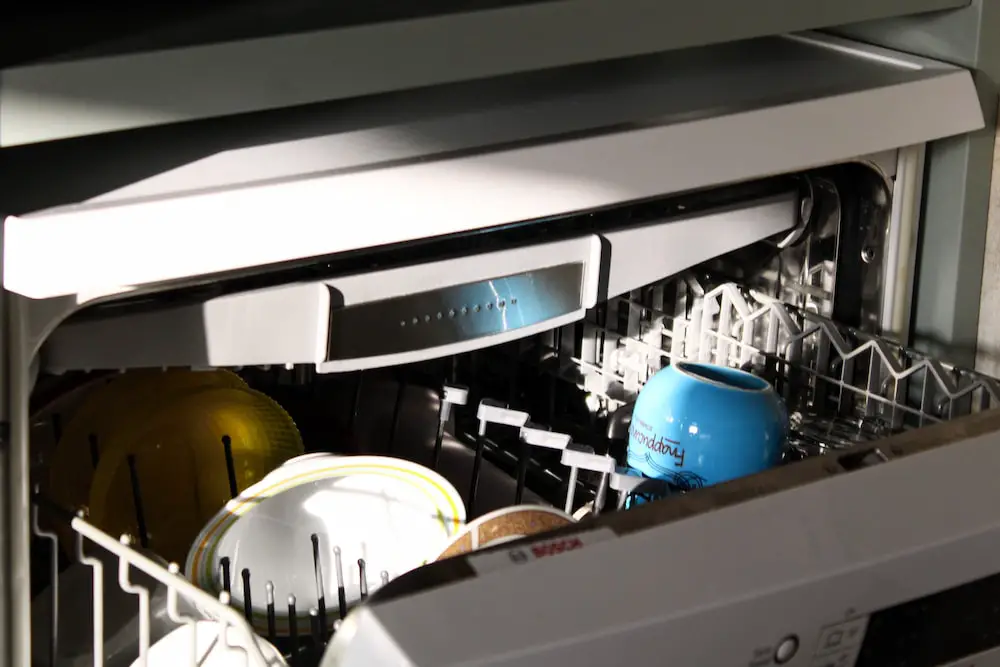Embark on a comprehensive exploration of dishwashers, an indispensable appliance in the contemporary kitchen. In this thorough guide, we will discuss everything you need to know about dishwashers, including their definition, history, different types, leading brands, pricing, important features, maintenance tips, water usage, installation considerations, parts, energy efficiency, and troubleshooting common problems. Immerse yourself in a pool of knowledge by accessing the Appliance Help Hub Guide!
What is the Definition of a dishwasher?
A dishwasher is a household appliance designed to automate the process of cleaning and sanitizing dishes, utensils, and cookware.

Historical background of dishwashers
Dishwashers have come a long way since their invention in the late 19th century. From manual labor to innovative technology, dishwashers have revolutionized kitchen cleaning routines.
The first mechanical dishwashing device was patented in 1850 in the United States by Joel Houghton. This early device, constructed from wood, required manual cranking while water was sprayed onto the dishes. However, it proved to be slow and unreliable, leading to limited adoption. In 1865, L.A. Alexander received a similar patent featuring a hand-cranked rack system. Despite these early innovations, both devices faced practical limitations and failed to gain widespread acceptance.
Some historians attribute the slow adoption to the prevailing societal perception that emphasized the value of women’s effort in housework rather than seeking ways to simplify it. This perception hindered the recognition of the importance of time-saving household appliances.
When and where was the first dishwasher invented?
The first dishwasher was invented in the late 19th century. It was invented by Josephine Garis Cochrane together with mechanic George Butters in 1886 in the United States.

Whom is Josephine Cochrane?
Josephine Garis Cochran (March 8, 1839 – August 3, 1913) was an American inventor and entrepreneur. She is best known for inventing the first practical dishwasher. Born in 1839 in Ashtabula County, Ohio, Cochrane was a wealthy socialite and a prominent figure in her community. Her motivation to invent the dishwasher came from her desire to find a more efficient way to wash dishes without risking damage to delicate china. In 1886, she patented her dishwasher design, which featured a rack for holding dishes, a water spray mechanism, and a hand-cranked mechanism to rotate the dishes. Cochrane’s invention laid the foundation for modern dishwasher technology and revolutionized the way dishes are cleaned in households around the world.
What were the initial features and design of the earliest dishwashers?
The earliest dishwashers were primarily hand-powered machines. They featured a rack for holding dishes, a water spray mechanism, and a hand-cranked mechanism to rotate the dishes while water was sprayed on them.
How did dishwashers evolve over time in terms of functionality and design?
Over time, dishwashers evolved to include more automated features and improved functionality. Electric motors were introduced to power the dishwasher’s mechanisms, timers were added for convenience, and more advanced water spray systems were developed to enhance cleaning performance.
What were some significant milestones or advancements in dishwasher technology throughout history?
Some significant milestones in dishwasher technology include the introduction of automatic detergent dispensers, the development of multiple wash cycles for different types of dishes, the integration of sensors to adjust water usage and temperature, and the incorporation of energy-saving features.
How did dishwashers become more accessible to households and mass-produced?
As technology advanced and manufacturing processes became more efficient, dishwashers became more affordable and accessible to households. Mass production techniques allowed for lower production costs, making dishwashers more widely available to consumers.
Were there any notable challenges or setbacks in the early development of dishwashers?
In the early development of dishwashers, one of the challenges was convincing people of their usefulness and demonstrating their effectiveness in cleaning dishes. Additionally, early models faced limitations in terms of size, capacity, and water efficiency.
How did dishwasher usage and popularity change over the years? Were there any particular factors that influenced this?
Dishwasher usage and popularity increased as people recognized the time-saving benefits and improved cleaning performance they offered. Factors such as changing lifestyles, increased focus on convenience, and advancements in dishwasher technology contributed to their growing popularity.
What role did dishwashers play in the modernization of kitchens and household chores?
Dishwashers played a significant role in the modernization of kitchens and household chores. They revolutionized the way dishes were cleaned, saving time and effort in the kitchen and allowing for more efficient meal preparation and cleanup routines.
Have there been any recent innovations or trends in dishwasher technology and design?
Recent innovations and trends in dishwasher technology include the integration of smart features, such as Wi-Fi connectivity and compatibility with virtual assistants, to enable remote control and monitoring. Energy-efficient models with improved water-saving capabilities and advanced soil sensors have also become more prevalent in the market. Additionally, there is a growing emphasis on customizable features and flexible loading options to accommodate different types of dishes and cookware.
What are the Importance and benefits of using dishwashers?
Dishwashers save time, energy, and water while ensuring efficient and hygienic cleaning. They eliminate the need for manual scrubbing and provide convenience, especially for busy households.
What are the Types of Dishwashers?
These are a common types of dishwashers that mostly used:
Built-in dishwashers

Built-in dishwashers are seamlessly integrated into kitchen cabinetry, offering a sleek and cohesive look. They come in various sizes and offer a wide range of features such as multiple wash cycles, adjustable racks, and advanced drying options.
Countertop dishwashers

Countertop dishwashers are compact, portable units that sit on the kitchen countertop. They are ideal for small kitchens or as secondary dishwashers. They offer simplicity, convenience, and easy installation.
Portable dishwashers

Portable dishwashers are freestanding units on wheels that can be easily moved around the kitchen. They offer flexibility for renters or those with limited space and provide similar features to built-in models.
What are the Popular Dishwasher Brands?
When it comes to choosing a dishwasher, there are several popular brands that have established themselves as leaders in the market. These brands are known for their exceptional quality, innovative features, and reliable performance. Whether you prioritize cutting-edge technology, efficiency, user-friendly designs, or smart connectivity options, there is a dishwasher brand that caters to your needs. Let’s explore some of the most popular dishwasher brands and the unique features they offer:
Bosch
Known for its cutting-edge technology, Bosch dishwashers prioritize performance, efficiency, and noise reduction. They incorporate advanced features and innovative wash systems to deliver outstanding cleaning results.
Whirlpool
As a trusted name in the appliance industry, Whirlpool offers a wide range of reliable and efficient dishwashers. Their models feature user-friendly designs, intuitive controls, and smart features that enhance convenience and cleaning performance.
GE General Electric
Combining reliability and performance, General Electric Company GE dishwashers are designed to deliver exceptional results. With advanced wash systems, sleek designs, and a focus on usability, GE dishwashers offers a range of options to meet various household needs.
Samsung
Known for their stylish designs, Samsung dishwashers bring a touch of elegance to any kitchen. They offer advanced features, such as flexible loading options, powerful cleaning capabilities, and smart connectivity for remote control and monitoring.
Kenmore
With a long-standing reputation in the market, Kenmore dishwashers are known for their durability and affordability. Kenmore dishwashers offer a wide range of models that deliver reliable performance and efficient cleaning at an accessible price point.
KitchenAid
For those seeking premium design and powerful performance, KitchenAid dishwashers are an excellent choice. They combine high-quality construction, innovative features, and customizable options to create a luxury dishwashing experience.
These popular dishwasher brands have earned their reputation by consistently delivering exceptional cleaning results, durability, and a wide range of features to suit different lifestyles and preferences. Whether you prioritize efficiency, convenience, or cutting-edge technology, there is a brand that will meet your expectations.
What are the Dishwasher Pricing and Sizes ?
Dishwasher prices vary depending on factors such as brand, features, size, and additional functionalities. Entry-level dishwashers typically start around $300, while high-end models can cost upwards of $1,500.
What are the Factors influencing dishwasher prices?
- Brand reputation and quality
- Energy efficiency ratings
- Noise levels and insulation
- Capacity and interior flexibility
- Advanced features and smart capabilities
What are the Most popular dishwasher sizes and their capacity?
The standard dishwasher size is 24 inches wide, 35 inches tall, and 24 inches deep. They typically offer a capacity of 12 to 16 place settings. Compact dishwashers and countertop models are available for smaller kitchens and offer a reduced capacity.
What are the Essential Features and Functions of Dishwashers?
A. Cleaning performance and efficiency
Dishwashers utilize various technologies, such as multiple spray arms, water filtration systems, and high-temperature wash cycles, to ensure thorough and efficient cleaning.
B. Energy efficiency ratings and certifications
Look for dishwashers with ENERGY STAR certification, which signifies that they meet strict energy efficiency guidelines. Energy-efficient models use less water and electricity, reducing utility costs and environmental impact.
C. Noise levels and insulation
Modern dishwashers are designed with advanced insulation and sound-dampening materials to minimize noise during operation. Look for models with a low decibel rating for quieter performance.
D. Wash cycles and customization options
Dishwashers offer various wash cycles to accommodate different dishwashing needs, such as heavy-duty, normal, quick wash, and eco-friendly cycles. Customization options, like delay start and half-load settings, provide flexibility and convenience.
E. Soil sensors and automatic adjustments

Dishwashers with soil sensors detect the level of dirtiness in the water and adjust the wash cycle accordingly, optimizing cleaning performance while conserving water and energy.
F. Delay start and programmable settings
These features allow you to set the dishwasher to start at a specific time, taking advantage of off-peak electricity hours or aligning with your schedule.
G. Interior lighting and visibility
Some dishwashers feature interior lighting that illuminates the interior, making it easier to load and unload dishes, especially in low-light conditions.
H. Smartphone connectivity and smart features
Certain models offer smartphone connectivity, allowing you to control and monitor your dishwasher remotely. Smart features include cycle notifications, diagnostic alerts, and integration with virtual assistants for voice control.
Maintenance and Care of a Dishwasher
What are the tips for Cleaning and maintaining the dishwasher?
- Regularly clean the filter, spray arms, and interior to remove food debris and mineral deposits.
- Use dishwasher-safe cleaning agents or homemade solutions to clean the interior and eliminate odors.
- Inspect and clean the door seal to prevent leaks and maintain a tight seal.
What are the Regular maintenance tasks and schedules of a Dishwasher?
- Check and clean the spray arms and nozzles every few months.
- Inspect and clean the filter regularly, following the manufacturer instructions.
- Ensure the dishwasher is level to optimize performance and prevent leaks.
- Check and clean the dishwasher’s exterior, including the control panel and door.
- Regularly inspect and clean the drain to prevent clogs and ensure proper drainage.
What are the common issues and troubleshooting solutions?
The common dishwashers issues and there troubleshooting dishwashers solutions:
- Dishwasher not starting:
- Check if the dishwasher is properly plugged in and the circuit breaker is not tripped.
- Ensure the door is securely closed and latched.
- Verify that the water supply is turned on and the water inlet valve is not clogged.
- Poor cleaning performance:
- Make sure dishes are properly loaded, allowing water to reach all surfaces.
- Check and clean the spray arms and nozzles to ensure they are not blocked.
- Use a high-quality dishwasher detergent and ensure proper dosage.
- Water not draining properly:
- Check the drain hose for kinks or clogs.
- Ensure the dishwasher’s air gap or garbage disposal connection is not obstructed.
- Clean the dishwasher’s filter to remove any debris blocking the drain.
- Leaking dishwasher:
- Inspect the door gasket for any signs of damage or debris.
- Check for loose or damaged hose connections.
- Ensure the dishwasher is level and not overfilled with dishes.
- Unusual noises during operation:
- Make sure dishes are properly loaded and not causing obstructions.
- Check for loose or damaged spray arms or utensil holders.
- Inspect the dishwasher’s motor and pump for any signs of malfunction.
Water Usage and Temperature
What is the Water consumption of dishwashers?
Dishwashers typically use around 3 to 5 gallons of water per cycle is equivalent to approximately 384 to 640 fluid ounces (oz) of water, a standard water glass typically holds around 8 to 12 fluid ounces, while a standard water bottle typically holds around 16 to 20 fluid ounces, depending on the model and cycle selected.
Therefore, a dishwasher cycle uses significantly more water compared to a single glass or bottle of water. It’s important to note that modern dishwashers have become more water-efficient over time, with some models designed to use as little as 2 to 3 gallons per cycle, further reducing water consumption.
What is the Impact of water hardness and use of water softeners on dishwashers?
Hard water can leave mineral deposits on dishes and the dishwasher’s interior. Consider using a water softener or dishwasher cleaner specifically formulated for hard water to prevent buildup and optimize cleaning performance.
What is the Optimal water temperature for efficient cleaning for dishwashers?
Most dishwashers require a minimum water temperature of 120°F (49°C) for effective cleaning. Some models offer a high-temperature wash option for more intensive cleaning and sanitization.
Installation and Cost Considerations
What are the dishwasher installation process?
Dishwasher installation involves connecting the water supply, drain line, and power source. It may require basic plumbing and electrical skills. Alternatively, professional installation services are available.
What are the Factors affecting installation costs?
- Complexity of the installation process
- Additional modifications required (e.g., plumbing or electrical work)
- Location and accessibility of the kitchen
Can Dishwasher DIY installation save money?
Dishwasher DIY installation can save money but requires technical knowledge and tools but Professional installation ensures proper connections, reduces the risk of leaks or damage, and may include disposal of the old dishwasher.
What are the difference between dishwasher parts and accessories?
The main difference between dishwasher parts and accessories lies in their function and integration with the dishwasher itself:
- Parts: Dishwasher parts are essential components that are integral to the functioning of the dishwasher. These parts are typically built into the dishwasher during manufacturing and are not meant to be easily removed or replaced by the user. Parts include items like spray arms, heating elements, pumps, control panels, filters, detergent dispensers, door latches, racks, tines, float switches, drain pumps, and hoses. These parts are necessary for the dishwasher to operate properly, and they are designed to be durable and long-lasting.
- Accessories: Dishwasher accessories, on the other hand, are optional add-ons or supplementary items that are not built into the dishwasher itself. These accessories are designed to enhance the dishwasher’s performance, convenience, or customization. Accessories can be easily added, removed, or replaced by the user. Examples of dishwasher accessories include dish rack extenders, utensil baskets, glassware holders, dishwasher cleaning tablets, rinse aid dispensers, adjustable tines and racks, and child locks. Accessories are intended to provide additional features, customization options, or specialized functionality based on individual needs or preferences.
In summary, dishwasher parts are integral components that are built into the dishwasher and necessary for its proper functioning, while dishwasher accessories are optional add-ons that provide additional features, convenience, or customization to enhance the dishwasher’s performance.
Dishwasher Accessories
What are the Description and purpose of dishwasher accessories?
Dishwasher accessories are additional components or items that can be used in conjunction with a dishwasher to enhance its functionality, efficiency, or convenience.
What are the Popular dishwasher accessories?
- Dish racks with adjustable tines for accommodating different dish sizes and shapes.
- Utensil holders or caddies for organized silverware cleaning.
- Spray arms or nozzles for targeted water distribution.
- Dishwasher-safe mesh bags for delicate items.
- Filter cleaning brushes for maintaining optimal performance.
Dishwasher Parts
What are the Description and purpose of dishwasher parts?
Dishwashers consist of various parts that work together to facilitate the cleaning and drying of dishes.
What are the essential dishwasher parts?
- Control panel and interface
- Water inlet valve
- Pump and motor assembly
- Spray arms
- Heating element
- Drain pump
- Filter
- Door latch and gasket
- Detergent dispenser
- Rack and basket components
How does a dishwasher work?
Dishwashers are sophisticated appliances that automate the process of cleaning dishes and utensils. Here is a step-by-step guide to How does a dishwasher work process.
Energy Efficiency and Environmental Considerations
What are the Energy-efficient features of dishwashers?
- ENERGY STAR certification
- Soil sensors for optimized water and energy usage
- Eco-friendly wash cycles with lower water and energy consumption
- Delay start options to take advantage of off-peak electricity rates
What are the Water-saving benefits of dishwashers?
Dishwashers typically use less water compared to manual dishwashing. Efficient models utilize targeted spray patterns and water recirculation for minimal water wastage.
What are Environmental impact and sustainability?
- Choose energy-efficient models to reduce carbon footprint.
- Opt for phosphate-free and biodegradable dishwasher detergents to minimize water pollution.
- Properly dispose of old dishwashers and recycle their components whenever possible.
Detergents for dishwashers
Detergents for dishwashers are specially formulated cleaning agents that are designed to effectively remove grease, food particles, and stains from dishes, utensils, and cookware. These detergents are specifically formulated for use in dishwashers and differ from regular dish soap or handwashing detergents. Here are some key points about dishwasher detergents:
What is the Formulation of detergents for dishwashers?
Dishwasher detergents are typically available in powder, gel, or tablet form. They contain a combination of enzymes, surfactants, and other cleaning agents that work together to break down and remove tough food residues.
Are these detergents clean good?
Dishwasher detergents are formulated to provide strong cleaning power and remove stubborn stains and grease. They are designed to work effectively in the high-temperature and high-pressure environment of a dishwasher.
Does Dishwasher Detergents Prevent Spot and Streak ?
Many dishwasher detergents include ingredients that help prevent spots and streaks on dishes and glassware. These ingredients, such as rinse aids or water softeners, reduce mineral deposits and promote better drying, resulting in spotless and streak-free results.
Is there Phosphate-Free dishwasher detergents?
Yes In some regions, phosphate restrictions have led to the development of phosphate-free dishwasher detergents. These detergents are formulated without phosphates, which were previously used as water softeners. Phosphate-free detergents are environmentally friendly and still provide effective cleaning.
Should we Pre-Soaking or Pre-Washing the dishes?
Most dishwasher detergents are designed to work effectively without the need for pre-soaking or pre-washing dishes. However, heavily soiled or baked-on items may benefit from a brief pre-soaking or pre-washing step to improve cleaning results.
What is the Dosage of Dishwasher detergents?
It is important to follow the manufacturer’s instructions regarding the proper dosage of dishwasher detergent. Using too much detergent can lead to excessive sudsing and poor rinsing, while using too little may result in inadequate cleaning.
Are Dishwasher detergents Eco-Friendly ?
Some dishwasher detergents are marketed as eco-friendly or biodegradable. These options aim to minimize their impact on the environment through the use of sustainable ingredients and packaging materials.
When selecting a dishwasher detergent, consider factors such as the hardness of your water, the type of dishes you frequently wash, and any specific preferences or concerns you may have. It is also recommended to choose a detergent that is compatible with your dishwasher’s specifications and follow the manufacturer’s guidelines for optimal results.
Conclusion
From their humble beginnings to today’s technologically advanced models, dishwashers have revolutionized the way we clean our dishes. By understanding the various types, features, and brands available, along with proper maintenance and troubleshooting techniques, you can make an informed decision when selecting a dishwasher for your kitchen. With their time-saving convenience, efficient cleaning performance, and energy-saving benefits, dishwashers truly are an essential appliance in the modern home. Happy dishwashing!








